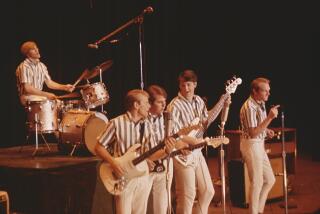Review: In ’63 Up,’ a power switch between doc series director and subjects
Filmmakers, especially those who do documentaries, like to talk about how long they’ve been working on a given project. Michael Apted, however, has got them all beat. By a lot.
“63 Up” is the ninth film in a series that Apted has been working on for 56 years. As doc fans know, nothing like it has been done in the history of film, and likely nothing will.
It all started in 1964, when Britain’s Granada TV gathered a group of 7-year-old schoolchildren from divergent economic backgrounds and asked them to talk about their dreams, their ambitions, their ideas about the future.
That 40-minute program went so well that future director Michael Apted (“Coal Miner’s Daughter”), who was a researcher on “7 Up” and helped select the original participants, has returned to interview the same group every seven years since.
On a grand scale the project considers if there is any truth to the class-conscious idea behind the original film, the Jesuit notion of “Give me the child until he is 7 and I will give you the man.”
But also being presented is a chance to see what the passage of years has done to the mind-set and the lives of individuals we have spent so much time with over so many decades they’ve become a quasi-family.
(People new to the “Up” series need not worry: Apted and Kim Horton, who has edited the series since “28 Up,” have included enough clips from the earlier films to nicely catch everyone up.)
While some of those earlier films had a jauntiness inevitable to youth, “63 Up” is perhaps the first where mortality makes its presence known.
Nick, a farmer’s son who ended up an academic in the U.S., reveals that he is seriously ill with cancer of the throat, and death itself, including that of one of the original group, is a factor in many lives.
On the other hand, many of the participants seem truly happy, often those who are in stable marriages or long-term relationships.
These include Sue, one of the original film’s trio of girls from London’s East End, who has been engaged to the same man for 20 years (“we’re going to set a record”), and Bruce, who has devoted his life to teaching and whose amused wife says, “I won’t divorce him but I may well murder him.”
Continuing a trend first visible in the previous film “56 Up,” “63 Up” reveals a shift in power dynamics between filmer and filmed, with the nominal subjects being less reticent about expressing grievances toward their venerable director, who is himself 78.
Lively East Ender Tony, for instance, a resilient study in candor, who ended up happily married and driving a London cab, remembers Apted’s lack of belief in him.
“You had visions of me in the nick,” he says with a bit of irritation. “You made quite a mistake, Michael.”
Even more irritated is Jackie, another of the former East End girls, who voices frustration at the way Apted’s questions for the young women were mundane and domestic in nature while men were asked about possible careers.
Still, almost everyone involved felt enough loyalty to the process and the end result to show up for this latest iteration. (The one exception, Suzy, had complained earlier that “lots of baggage gets stirred up every seven years.”)
Aside from Tony, who starts the film, the person whose story is most involving is always Neil, who went from being homeless in Scotland to a success in local politics in the London borough of Hackney, and whose articulate, forceful ruminations always hold our interest.
While some individuals are inevitably more compelling than others, as a whole the entire series, and “63 Up” in particular, is completely enveloping as it draws us into the latest happenings of these people we’ve followed for so long. In the final analysis, we see our lives reflected in theirs and that is a remarkable thing.
'63 Up'
Not rated
Running time: 2 hours, 18 minutes
Playing: Landmark Nuart, West Los Angeles
More to Read
Only good movies
Get the Indie Focus newsletter, Mark Olsen's weekly guide to the world of cinema.
You may occasionally receive promotional content from the Los Angeles Times.











